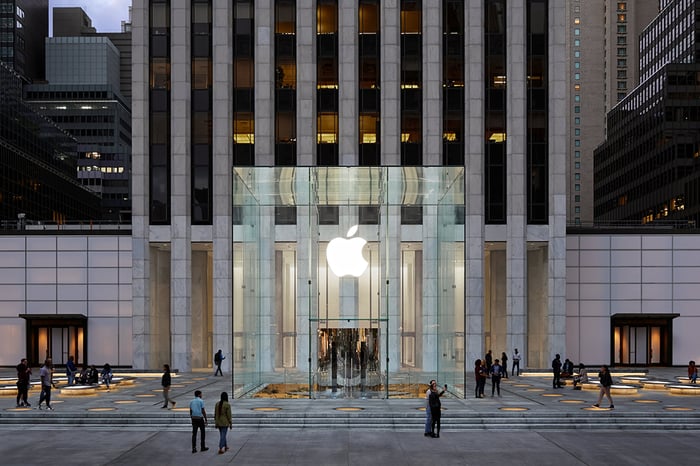Apple's (AAPL 0.64%) stock hit an all-time high on Dec. 9 after two influential analysts made bullish predictions about the tech giant's future.
Wedbush analyst Daniel Ives declared that global demand for the iPhone 13 was still outstripping its supply by about 10 million units, that its holiday sales would be strong, and that Apple's upcoming launch of an augmented reality (AR) headset would significantly boost its sales and profits next year.
Morgan Stanley's Katy Huberty claimed Apple's price didn't reflect its upcoming AR, VR, and vehicle-related products yet, and that it would benefit from a "flight to quality" from other stocks. Both analysts have set a price target of $200 on Apple's stock -- roughly 14% above its current price.

Image source: Apple.
Is Apple's stock really such a great investment? Let's discuss five reasons to buy this tech bellwether -- as well as one reason to sell it -- to decide.
1. The iPhone's 90% loyalty rate
Apple's overwhelming dependence on the iPhone, which generated 52% of its revenue in fiscal 2021, is often cited as a major weakness by the bears. However, a recent study by Consumer Intelligence Research Partners (CIRP) indicates that 90% of iPhone buyers still plan to stick with Apple.
Two factors keep its users firmly locked in. First, Apple's expanding ecosystem of first-party services discourages its users from switching to Android devices. Second, iPhones are widely considered status symbols with a luxury appeal that even the priciest Android devices still can't match.
2. 745 million paid subscribers
Apple finished fiscal 2021 (which ended in September) with 745 million paid subscribers across all of its services, which represents nearly fivefold growth from five years ago. Its annual services revenue, which accounted for 19% of its top line in 2021, has nearly tripled over the past six years.
3. $191 billion in cash and equivalents
Apple ended the year with $191 billion in cash and marketable securities. That gives it plenty of room to expand its software and services ecosystem with new content, develop new AR devices, and invest in its secretive electric vehicle projects. Apple could also acquire more companies to accelerate those efforts and reduce its overall dependence on the iPhone.
4. It's well insulated from inflation
Rising inflation causes component and labor costs to rise. Therefore, companies that can't negotiate lower prices with their suppliers or pass those higher costs onto their consumers will suffer.
Apple doesn't need to worry about either headwind yet. It leverages the strength of its brand and the size of its orders to pressure suppliers to lower their costs, and it often splits orders for the same components between multiple suppliers to prevent them from gaining an edge in price negotiations.
Apple has also been designing more first-party chips to reduce its dependence on third-party chipmakers. That's why it replaced Intel's (INTC -0.38%) CPUs with its own Arm-based CPUs in its Macs and MacBooks over the past year, and why it acquired Intel's baseband modem division to reduce its dependence on Qualcomm (QCOM 0.73%).
As for passing on its higher costs to consumers, Apple's brand loyalty arguably gives it more room to raise its prices than other hardware makers. In short, Apple is much more resistant to inflation than other tech stocks.
5. $86 billion in buybacks
Apple bought back a whopping $86 billion in shares throughout fiscal 2021, which reduced its total number of outstanding shares by nearly 4%.
Over the past five years, Apple has reduced its share count by 22% as its stock price has soared nearly 500%. Apple will continue this tradition of big buybacks to tighten up its valuations for the foreseeable future.
The one reason to sell Apple: its forward valuation
I've owned Apple for many years, and I don't plan to sell my shares anytime soon. However, I'm not as bullish as Ives or Huberty on Apple's near-term future for a simple reason: Its stock is getting expensive.
Apple already trades at 30 times forward earnings. That's a very high price-to-earnings ratio for a company that is expected to grow its revenue and earnings by 4% and 2%, respectively, this year. Next year, analysts expect its revenue and earnings to grow just 4% and 7%, respectively.
At $200 a share, Apple would be trading at 35 times forward earnings -- which is a very high valuation even if we factor in its upcoming products in 2022.
Apple's upside potential could be limited
Apple is a great long-term investment, but investors who don't already own the stock should have realistic expectations about its upside potential. The stock might rally to $200 on the recent speculation about Apple's upcoming products, but I don't think those gains will be sustainable.
Investors can accumulate some shares of Apple now, but they shouldn't expect it to generate meaningful long-term gains until it actually releases its long-rumored AR, VR, and automotive products.





